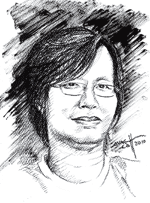Since entering Burmese politics in 1988, Aung San Suu Kyi's choices, like everything else in her life, have been severely restricted. And yet, she has had to make some of the most fateful decisions in her country's recent history. Tomorrow she will have to do the same again, as her party, the National League for Democracy (NLD), decides whether to re-register as a political party.
In 1990, she endorsed the NLD's decision to contest an election held by the then ruling regime, even though she herself was under house arrest at the time and barred from running. At first, some in the party opposed her decision, saying that there was no guarantee the result would be honored.
The critics’ point made sense, and proved well-founded after the junta refused to recognize the NLD's landslide victory. But does this mean that Suu Kyi made the wrong call? Would it have been better if the party had boycotted the election?
 |
Kyaw Zwa Moe is managing editor of the Irrawaddy magazine. He can be reached at [email protected].
|
Looking back, it seems that contesting the election was the right thing to do, even if there were good reasons for opposing the move. Why? Because the election result was recognized by the international community, even if it was ignored by the regime, and served as a political stick with which to beat the ruling generals over the past 20 years.
At other times, however, Suu Kyi has chosen not to participate in the regime's “political process.” In 1993, when she was still under house arrest, the NLD took part in the constitution-drafting National Convention. But in November 1995, soon after her release, the party walked out of the convention in protest at the junta's efforts to maintain a stranglehold over debate.
There can be little doubt that it was Suu Kyi's input that led to this decision. But was it the right thing to do? At the time, many dissidents and NLD supporters applauded the party's walk-out as a brave and necessary move. In terms of its impact, it effectively derailed the regime's efforts to enshrine a political role for the military for the next eight years. But in the end, the junta produced the document it wanted—the 2008 Constitution, Burma's first charter since 1988.
Would it have been better for the NLD to stick it out and try to push for more democratic provisions? Given the restrictions imposed on delegates to the National Convention—most of whom were handpicked by the generals—it's unlikely that such efforts would have had much success. The only long-term effect of staying in the convention would have been to lend legitimacy to the final product—something it still lacks.
So it seems that the NLD, guided by Suu Kyi, made the right call in 1995. But what about its decision to boycott last year's election, again under Suu Kyi's influence?
This time, there was far more ambivalence than in the past about whether to play along with the regime's plans. No one seriously believed that the election would be free or fair, or that the junta would tolerate any outcome other than the one it had planned in advance. But many argued that it was necessary for the NLD to reenter the political fray after more than a decade of playing cat and mouse with the authorities that had left the party struggling for its survival.
It was only after Suu Kyi (again under house arrest) issued a statement saying that she couldn't imagine the NLD registering under the junta’s repressive electoral laws that the issue of whether to contest the election was resolved, albeit not to everyone's satisfaction (a small faction of the NLD formed a new party, called the National Democratic Force, and ran in the election).
A little over one year after the election, however, there are still some who say that the NLD should have contested it, if only to force the regime to show its repressive true colors, or—in a more unlikely scenario—to give it some say in the country's political affairs through its representation in Parliament.
A year ago, some analysts even predicted that the NLD's decision to boycott the election, and in the process forfeit its legal status as a political party, would be the final nail in the coffin of its political relevance. But the events of the past year suggest otherwise.





